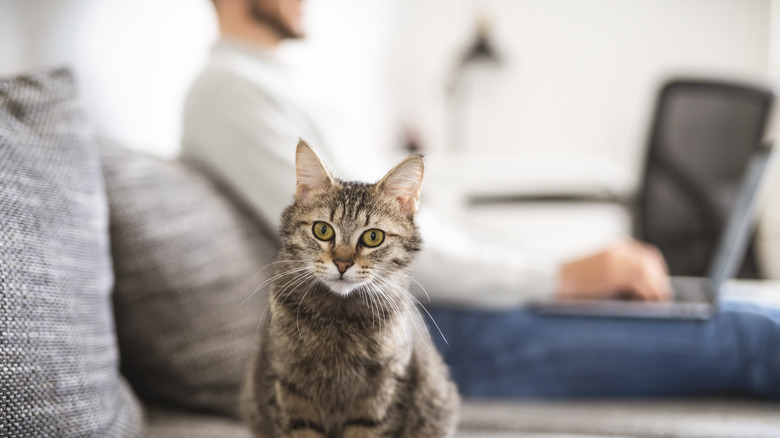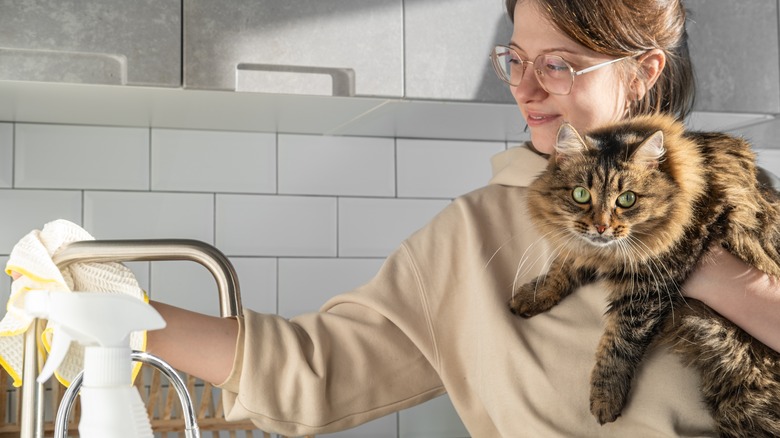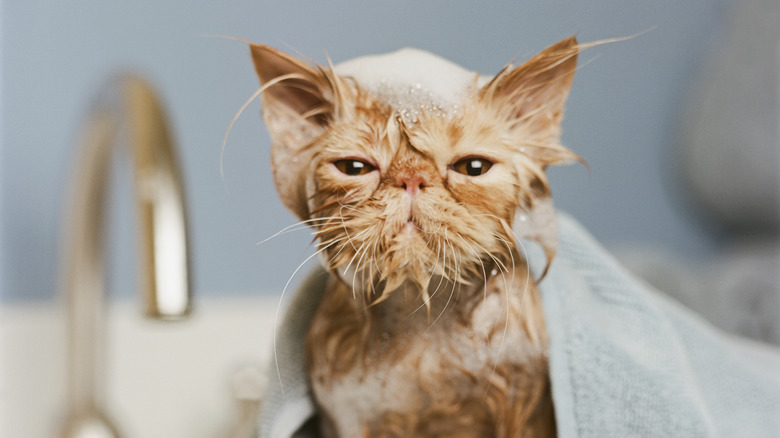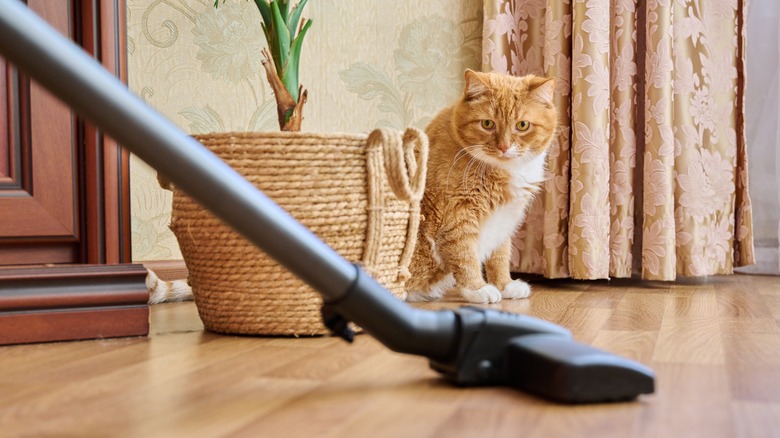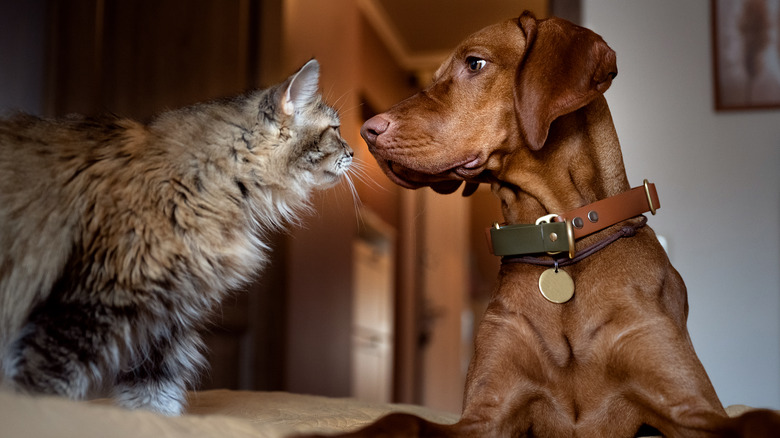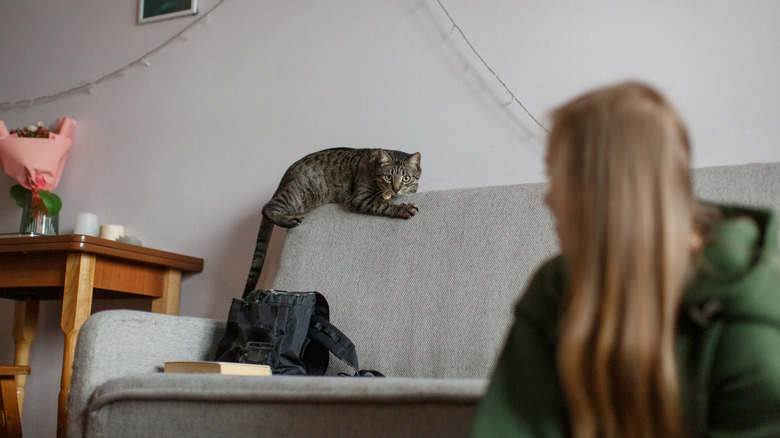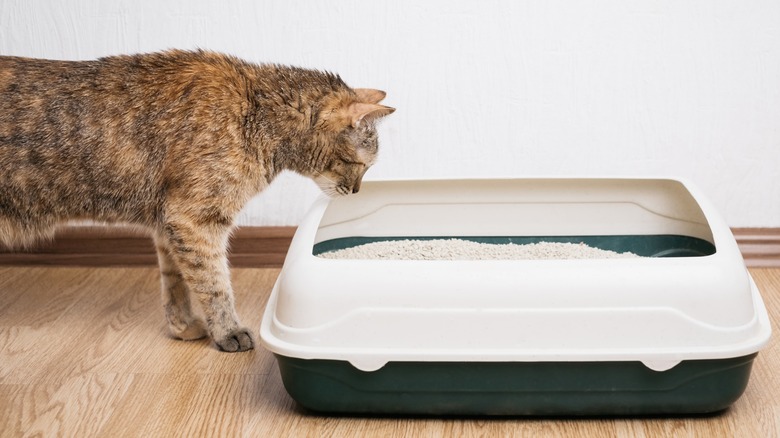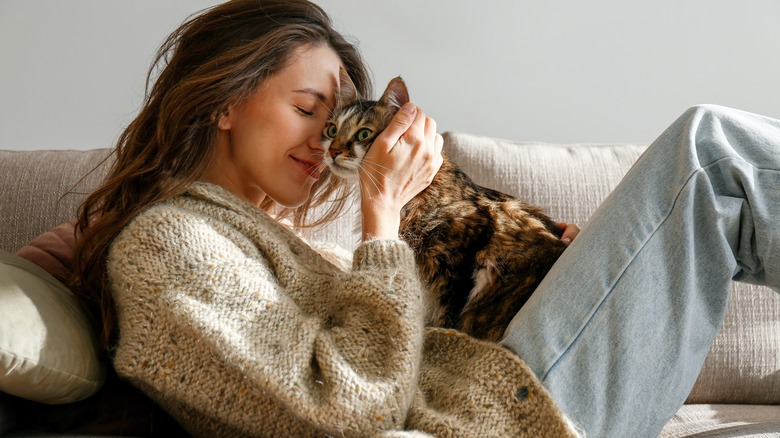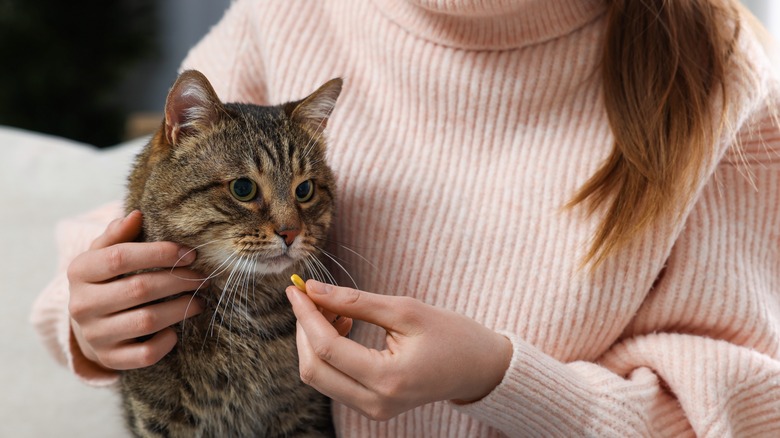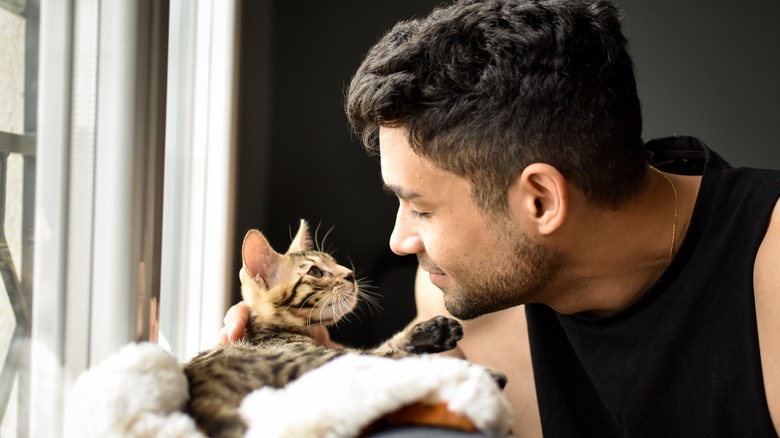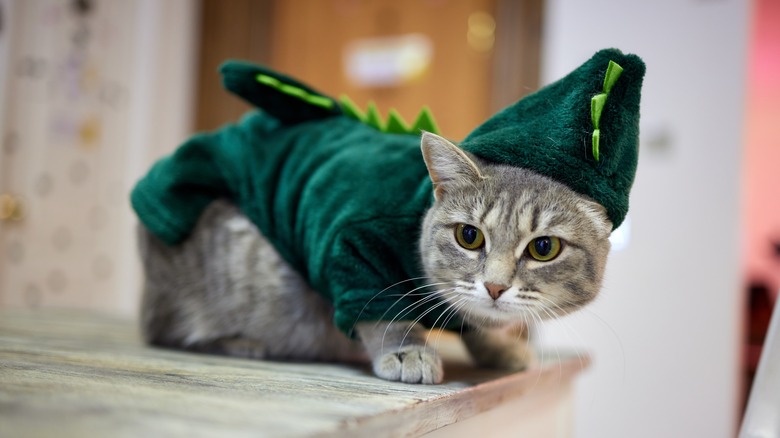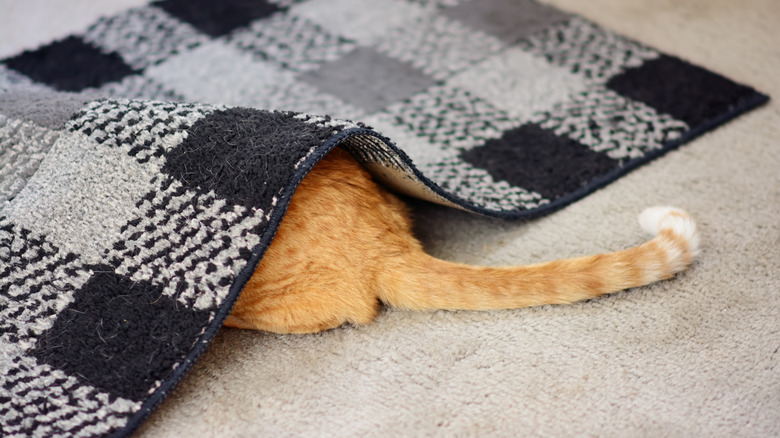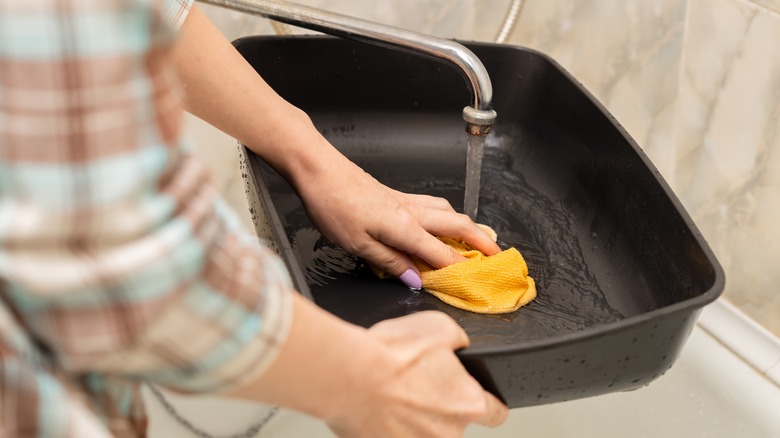14 Things You Do That Your Cat Actually Hates
As much as you try your best to make your family members happy, there are going to be moments that cause friction. No two people are alike, and the same is true for cats. What one cat may tolerate, another may hate. If your goal is to make sure your cat is safe, healthy, and comfortable, you're doing a great job – even if some your methods annoy them.
However, it's important to understand why your cat hates the things they do. Is it because they're just being picky, or do your actions make them feel overwhelmed and anxious? If it's the latter, work on creating a quiet, safe space for them, which they can retreat to when they feel triggered by something that is out of your control. Taking medicine and getting a bath are two things cats hate, but they're necessary for their health. However, some things you might be doing that your cat isn't all that happy about can be avoided altogether.
1. Using scented cleaning products
Many people gravitate towards laundry detergents and other cleaning products with citrusy or floral scents because they freshen up the home. If you've thrown your cat's blanket into the washing machine along with your other clothes only for your cat to avoid it once it's come out fresh and clean, it might be because they hate how it smells. Although you had good intentions, you may have accidentally caused your cat to feel overwhelmed and anxious.
A cat's sense of smell is their strongest sense and is 14 times more sensitive than humans, which is why cats hate it when you wash their blankets with scented detergents. Although you might like a fresh-smelling blanket to cuddle, felines don't. They rely on their sense of smell to understand and explore their environment. When you use strong-smelling detergents and cleaners, you hinder this ability, potentially making them feel vulnerable and unsafe.
Thankfully, alternative options are available on the market to keep your cat happy, such as unscented pet-friendly cleaning products. You can use these when washing your cat's bedding, furniture, harnesses, collars, and plush toys. This should reduce stress in your cat and prevent any potential allergic reactions they may have towards the harsh chemicals inside many common household detergents.
2. Giving them a bath
Cats have excellent built-in grooming tools, such as their tongue and claws, so it's no wonder they can spend up to 50% of their day focusing on self-care (per the Cornell Feline Health Center). However, no amount of grooming can get stubborn mud and other adhesive substances out of their coat, so an occasional bath is necessary. Unfortunately, most cats don't enjoy baths, so try to do it in a quiet environment without other stressful distractions. Focus on remaining calm, no matter your cat's reaction, and talk reassuringly to them throughout the process.
The majority of cats naturally avoid water, which is why they hate bathing. Being in the water takes their control away and leaves them feeling vulnerable. Their fur also takes a while to dry, which causes them to feel restricted and uncomfortable. It's normal for cats to feel anxious around bath time because it is an uncommon activity. Frequent baths are not necessary for cats unless they have mobility issues due to old age, pain, or obesity, they've gotten into a sticky substance, they have poop stuck in their fur, or their veterinarian recommends it for whatever reason.
If your cat simply cannot handle a bath or you're unable to do it safely, you can consider alternatives to using water. Pet-safe wet wipes or a damp cloth might be better tolerated by your cat. For more serious messes, pet-friendly dry shampoo may also do the trick. Lastly, taking your cat to a professional groomer with experience bathing cats could be another route to consider.
3. Vacuuming their environment
When you picture a cat, you probably envision them curled up on a bed in a quiet bedroom. Cats live for peace and tranquility, so it's no surprise that they get very disgruntled when you disrupt that with big, loud noises. Vacuuming your home is one of the things that cats particularly hate.
Vacuum cleaners are big, loud, and smelly machines that can be frightening to cats. Not only do they start up suddenly, but they move in unpredictable ways. Your cat's senses of hearing and smell are incredibly sensitive, so it's no wonder they run out of the room whenever you pull out the vacuum cleaner. Of course, you can't avoid vacuuming your home, especially with your hair-dropping cat around, but always be mindful of your feline companions when doing so.
Introducing your cat to the vacuum cleaner in a non-threatening way may help them feel more comfortable around it, especially when it is off. However, most cats still won't want to be around it when it's on. It might suit your cat best to hang out in a quieter room while you vacuum the rest of the house.
4. Bringing home a new pet
Whether your new pet is young or old, your naturally territorial cat may see them as a threat and try to protect themselves and their environment by getting aggressive. This is especially true if the new pet is a dog, which cats recognize as predators. Your cat will feel more relaxed about the new addition if they have their own areas in the home. This can include a bed in a different room, a cat tree, or a cat perch high enough for your feline to retreat to if they want to be alone.
For a successful introduction process, Animal Humane Society recommends starting off by keeping the new pet in a separate room for a few days. This will help your cat and new pet get used to each other's smells and sounds. Next, feed the two pets on the opposite sides of a closed door. This will allow them to associate something good with the other pet's smell.
You'll then move on to short interactions, which should happen in a common area in your home. If the new pet is a dog, keep them on a leash during these sessions and reward each pet for any good behavior. Repeat these interactions for a few days before allowing the pets to interact freely around each other under your supervision. It can take months before your cat accepts the new pet, but by introducing them properly, your feline will feel less overwhelmed and anxious.
5. Moving furniture around
Although change can be as good as a holiday, your cat doesn't feel the same way. As much as moving furniture around may seem like a minor difference to you, cats thrive off routine and structure, so moving their favorite chair to a different spot can leave them feeling unsettled and stressed out. Like most things, some changes might be unavoidable, but keep your cat in mind and try your best to avoid shifting their items and furniture.
Not only does moved furniture disrupt your cat's routine, but it also impacts their sense of security. Suddenly, the all-too-familiar scents that make them feel calm and relaxed have shifted, and that comfort is gone. For older cats, this can cause confusion and anxiety.
To avoid a negative impact on your cat, consider their daily routine and keep their common spots available to them. To help your cat adapt better, consider moving different furniture over time instead of all on the same day. If a favorite piece of furniture does have to move or be sold, consider using a pheromone spray on a new piece of furniture, which will help them feel relaxed and secure.
6. Taking them for a drive in the car
Unlike some dogs, cats aren't the best companions to take along on drives. Cats hate new environments, unpredictable movement, and unfamiliar noises and smells, which can all be expected during a car drive. Car rides are even worse for some cats because of their negative association with their cat carrier.
For others, car rides aren't just stressful; they're uncomfortable because they experience motion sickness. Interestingly, motion sickness in cats is less about the car's motion and more about the anxiety associated with the car ride and the potential destination, which is usually an appointment with their veterinarian. Regardless, it usually results in vomiting or defecation. Since car rides are stressful, sitting in the back with your cat while someone else takes the wheel could be very reassuring for them. Getting them comfortable with their cat carrier and the inside of your car while it is off are other ways to calm your cat's nerves and ultimately prevent motion sickness.
7. Having strangers over
Although making new friends is important, your cat hates it when you bring unfamiliar people into their home. Not only are strangers invading your cat's space, but their laughter and unfamiliar smells can stress your cat out. Because of this, your feline probably won't want to hang around them at first and they likely retreat to a safe and quiet area in the house. They might stay there until your friends leave or come out once they decide they're not a threat.
Ask your visitors to respect you cat's space; you can then entice your feline into the room where your friends are sitting by distracting them with their favorite toys or offering them their favorite treats. If your cat is particularly anxious, allow them to venture out of their safe space in their own time. Trying to stop your cat from getting away by holding them in your arms will only stress them out more. Cats hate being restricted, and doing this will create a negative experience for them. Your cat may warm up to your friends over time, so don't rush them.
8. Switching cat litters
Once a cat likes a certain litter, stick to the same one or similar types. Just as cats like to have a daily routine, they also like to know what to expect when using their litter box. Changing the type of litter in their box can throw them off and stress them out. This can result in them rejecting their litter box and eliminating outside of it instead.
It might not even be the new texture that upsets your cat; it could be the new smell. If you're trying out a scented litter and your cat is used to unscented, it could be off-putting to your cat. Some natural litters don't contain any added fragrances, but your cat might be put off by its "natural" smell, which is sometimes the case with walnut, pine, and grass litters.
Some cats, such as those that have been declawed, have sensitive paws and require soft litter. If you suddenly change their litter to something harder, like pelleted litter, it will hurt to use, and they may stop using their litter box. If you have a cat with sensitive paws, chat with your veterinarian about the options best suited to your cat.
9. Giving them too much or too little attention
As much as you may want to cuddle your cat whenever they walk into the room, they may not feel the same way. Of course, each cat has their own personality, and some cats are more affectionate than others, but they're typically pretty independent pets. This means they may shy away from constant attention and even give you the cold shoulder. When this happens, don't force them to engage with you; rather, give them the space they need.
Finding the balance between how much and how little attention to give your cat can be tricky. The best thing to do is to give your cat attention when they ask for it. When your cat is ready for attention, they'll nuzzle their head or body against you, follow you around, or meow at you.
If your cat isn't in the mood to be petted or cuddled or has had enough of it, they can become frustrated and lash out aggressively. Your cat will communicate their likes and dislikes to you with their body language, so watch out for the signs. In the same way, not giving your cat the attention they crave when they want it will cause them to feel lonely and upset. Although independent, they're also incredibly social!
10. Giving them medicine
No one likes taking medicine, right? Well, this is particularly true for your cat. And because of their feisty personalities, they may outright refuse to take it when you try to give your cat medicine. Oral medicine can be given to a feline in pill or liquid form. Unfortunately, most pills need to be forced down a cat's throat because they're unwilling to swallow it themselves. If you have to give your cat a pill, never give it to them dry, as it can hurt their esophagus. Instead, Small Door Veterinary advises coating it in some soft food first to help it slip down their throats more easily.
Unlike pill forms, liquid medication usually doesn't require any force, and in cases where it does, there is no risk of it getting stuck in a cat's throat. Liquid medication can be mixed into a small amount of canned food, which most cats will willingly lick up. However, pickier cats may refuse the food because of the foreign smell. In these cases, you'll need to wrap them in a blanket and syringe the medication into their mouth while you talk to them reassuringly.
11. Making direct eye contact
When cats feel threatened or try to assert dominance over a person or animal, they will stare them down, stiffen their body, and raise their hair. What the cat is trying to communicate with their body language is quite clear: "Back off." If the message isn't understood or is ignored, the cat may attack aggressively. This message is clearly understood in the animal kingdom, which is why cats generally don't stare directly into another cat's eyes.
In the same way, a nervous or unfamiliar cat can feel challenged by you when you make direct eye contact with them and may think that you're looking for a fight. If the cat feels comfortable around you, they may not mind eye contact. However, when you do connect your gaze, remember to keep your face relaxed and blink softly at them. They're more likely to interpret this as a non-threatening, affectionate gaze and may reciprocate it back to you.
12. Dressing them up
One of the best parts about celebrating the holidays can be looking for a cute outfit (for you and your cat) and dressing up. If your cat doesn't mind getting dressed up for a quick photo, there's no harm in a little fun, but never leave them in their costume or other types of restrictive clothing. Not only will your cat hate it, but it can be dangerous. If your cat gets stressed out about dressing up, don't force it because it can negatively impact your bond and cause your cat to become distrustful of you.
Costumes and some clothing can restrict your cat's movements, prevent them from eliminating, and put them at risk of overheating. They can easily get caught on a branch or a hook that could cause your cat to choke or not be able to break free. A cat's coat does an excellent job keeping them warm, and clothing is usually unnecessary, except for hairless breeds and cats with hair loss problems, such as alopecia.
13. Petting their tail and other sensitive areas
No matter how cuddly your cat is, few cats likes their tail being touched. Young children often want to play with the tail because it's fun to catch, so it's important to teach them how to pet a cat properly. The tail contains many nerve endings, making it a very sensitive part of a cat's body, and touching it isn't typically a pleasant sensation for them.
When you pet your cat, use a soft and gentle and watch their body language. Once they've had enough, stop petting them. Otherwise, they could become irritated and bite or scratch you. Areas on your cat's body to avoid are the tail, tummy, paws, and legs. These areas are either sensitive or too vulnerable, and when petted, your cat may feel uncomfortable. Rather, focus your attention on your cat's face, neck, and lower back – they'll thank you for it!
14. Taking too long to clean their litter box
Sometimes, the day gets away from you, and before you can catch our breath, it's bedtime. In the busyness of life, it's easy to forget things that don't demand immediate attention. However, it's important not to overlook the needs of your pets. Cleaning out the litter box isn't fun, but waste must be scooped out every day.
Cats are particular about cleanliness, which is why they groom themselves so thoroughly. But they also expect their environment to be kept clean too. A dirty litter box with a bad odor is off-putting and unhygienic for a cat, and they may choose to eliminate outside of their litter box instead. Depending on the type of cat litter you have and how sensitive your cat is, you may need to replace the litter as little as once a week. When you do, discard all of the litter, soak the box in hot water with a squirt of liquid dish soap, dry it with a towel, and then pour in fresh litter.
